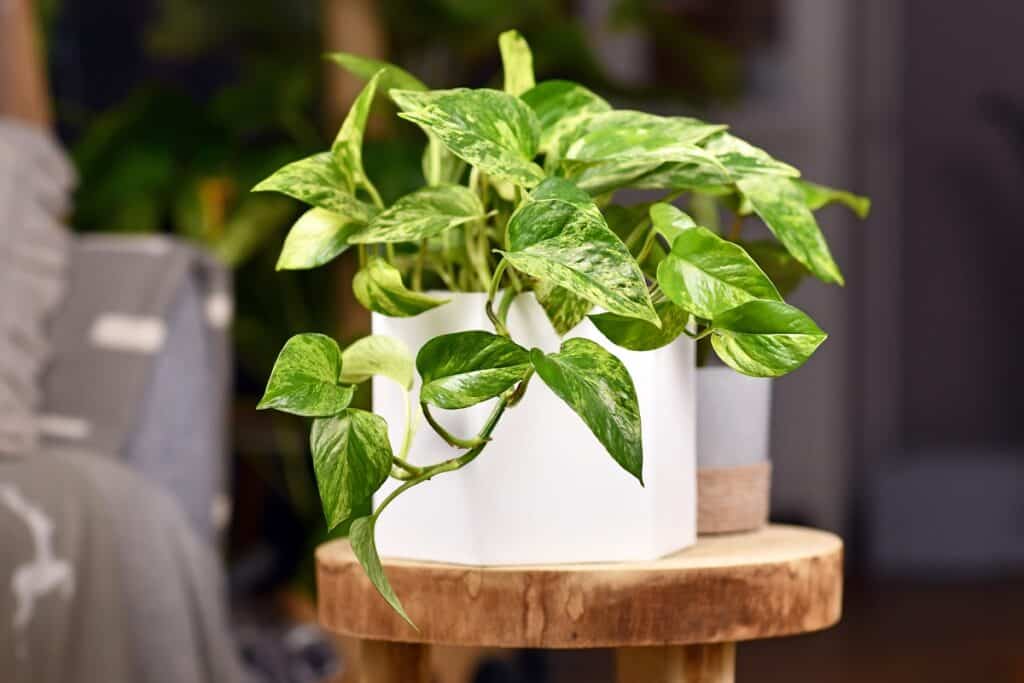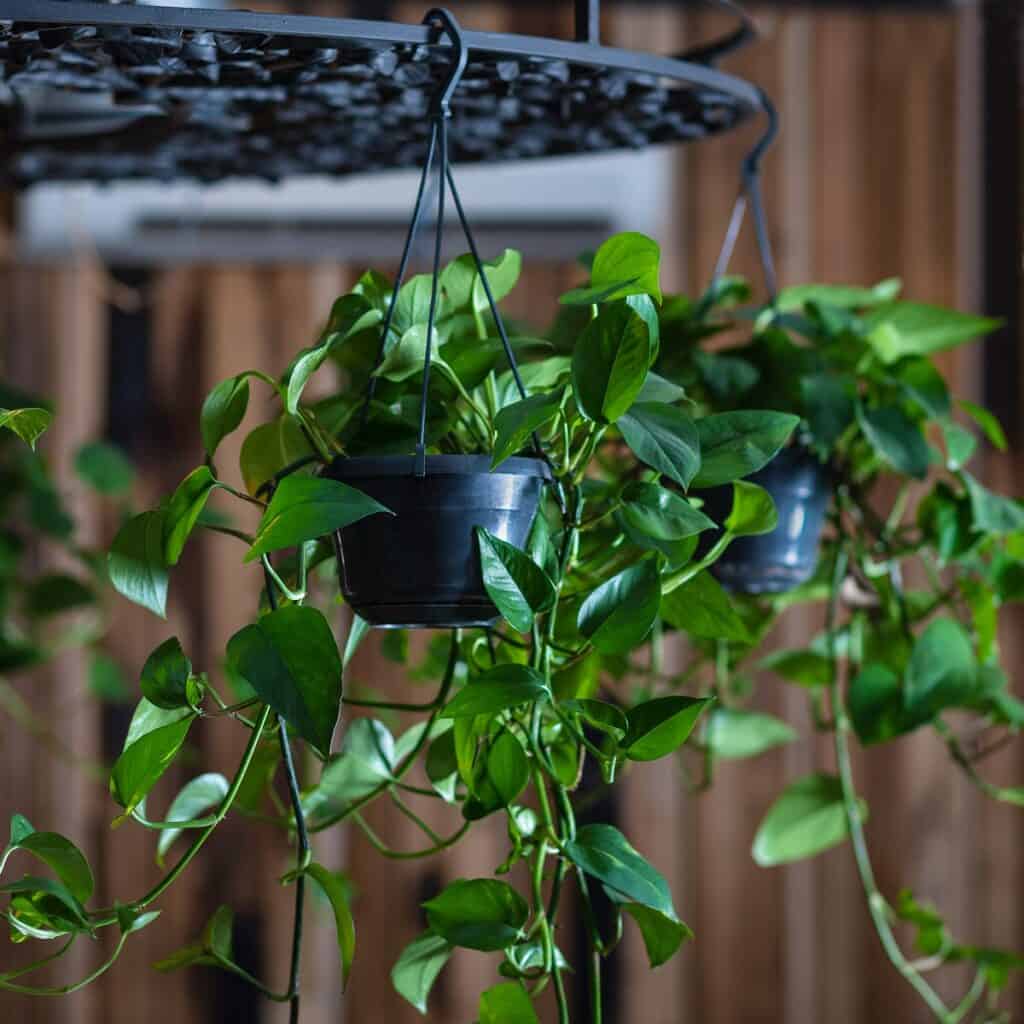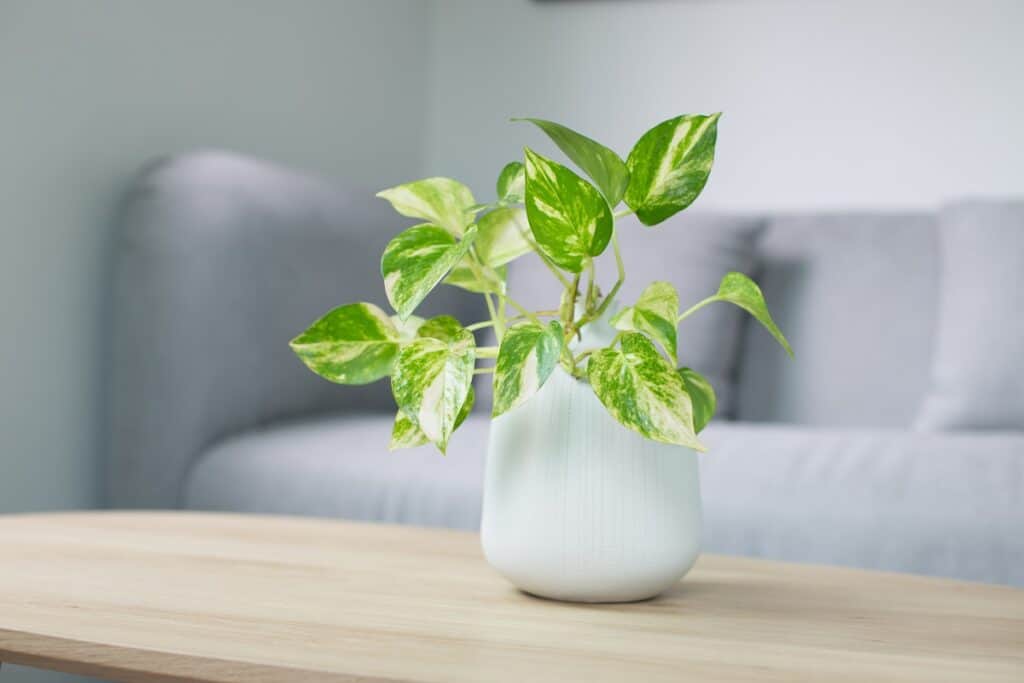Golden pothos, also known as Devil’s Ivy, is a popular houseplant due to its ability to thrive in a variety of environments and its ability to purify the air. However, one question that many cat owners may have is whether or not golden pothos is poisonous to their feline friends. In this blog, we will explore the answer to the question: is golden pothos poisonous to cats?

Contents
- 1 Is Golden Pothos Poisonous To Cats?
- 2 Symptoms Of Golden Pothos Poisoning In Cats
- 3 Treatments For Golden Pothos Poisoning In Cats
- 4 How To Prevent Golden Pothos Poisoning In Cats
- 5 Frequently Asked Questions
- 5.1 Do cats like pothos plants?
- 5.2 Are all types of pothos toxic to cats?
- 5.3 How much pothos is toxic to a cat?
- 5.4 What part of pothos is toxic to cats?
- 5.5 How long does pothos poisoning last in cats?
- 5.6 What should I do if my cat ate a pothos leaf?
- 5.7 How long does it take for a cat to show signs of poisoning?
- 5.8 Are pothos only toxic if ingested?
- 6 Conclusion
Is Golden Pothos Poisonous To Cats?
Yes, golden pothos (Epipremnum aureum) is poisonous to cats if ingested. The plant contains calcium oxalate crystals which can cause skin irritation, swelling, and redness. If a cat ingests any part of the plant, they may experience irritation and swelling of the mouth and tongue, difficulty swallowing and vomiting.
If a cat chews or eats a large amount of golden pothos, they may suffer from gastrointestinal distress, difficulty breathing and lethargy. This could require immediate medical intervention to prevent further complications.

Symptoms Of Golden Pothos Poisoning In Cats
Ingestion of golden pothos can cause a range of symptoms in cats, including:
- Swelling and irritation of the mouth and tongue
- Difficulty swallowing
- Drooling
- Vomiting
- Difficulty breathing
- Lethargy
The severity of the symptoms will depend on the amount of plant material ingested and the size of the cat. If you suspect that your cat has ingested any part of a golden pothos plant, it is important to seek veterinary care immediately. A veterinarian will be able to assess the severity of the poisoning and provide appropriate treatment. In severe cases, hospitalization may be necessary. It is important to bring a sample of the plant with you to the veterinarian so that they can accurately diagnose and treat the poisoning.
Treatments For Golden Pothos Poisoning In Cats
Treating golden pothos poisoning in cats can be a challenging and often expensive endeavor. The best way to avoid golden pothos poisoning in cats is to keep them away from the plant entirely. If your cat is showing signs of golden pothos poisoning, it is important to contact your veterinarian immediately, as the symptoms can quickly become life-threatening.
Once your cat is diagnosed with golden pothos poisoning, your veterinarian will likely make one or both of two primary treatments. The first is to induce vomiting and give your cat activated charcoal to help absorb any toxins. This helps to rid your cat’s system of any remaining toxins.
The second treatment for Golden Pothos poisoning in cats is to administer fluids, medications, and other supportive care to help your cat recover. Your veterinarian may prescribe medications to help reduce the amount of toxins in your cat’s system and to help relieve vomiting and other symptoms. In some cases, your cat may need to stay in the hospital for a few days in order to receive supportive care.
It is important to remember that golden pothos poisoning can be fatal if left untreated. If your cat is showing symptoms of poisoning, take them to a veterinarian as soon as possible for proper treatment. With prompt and appropriate care, most cats make a full recovery from golden pothos poisoning.
How To Prevent Golden Pothos Poisoning In Cats
There are a few steps you can take to prevent golden pothos poisoning in cats:
1. Keep the plant out of reach: The most effective way to prevent an accidental ingestion is to keep the plant out of reach of your cat. This can be done by hanging the plant in a high location or placing it on a shelf or tabletop that is out of your cat’s reach.

2. Consider alternatives: If you are concerned about the safety of golden pothos around your cat, consider choosing a different houseplant that is safe for cats. There are many options available that can bring greenery and purify the air in your home without posing a risk to your feline friend.
3. Keep an eye on your cat: If you have a golden pothos plant and a cat, it is important to monitor your cat’s behavior and pay attention to any changes. If you notice your cat displaying symptoms such as swelling of the mouth or difficulty swallowing, it is important to seek veterinary care immediately.
4. Consult a veterinarian: If you have any concerns about the safety of your houseplants or the health of your cat, it is always a good idea to consult a veterinarian. They will be able to provide you with guidance and advice on how to keep your cat safe and healthy.
Frequently Asked Questions
Do cats like pothos plants?
It is not uncommon for cats to chew on or eat plants, especially if they are young or have a habit of exploring their environment. While some cats may be attracted to the leaves of a pothos plant, it is not necessarily because they like the taste. In fact, pothos plants can be toxic to cats, so it is important to keep them out of reach to prevent accidental ingestion.
Are all types of pothos toxic to cats?
Yes, all types of pothos plants are toxic to cats if ingested. Pothos plants contain calcium oxalate crystals, which can cause irritation and swelling of the mouth and tongue, difficulty swallowing, and vomiting in cats. In severe cases, ingestion of pothos can lead to more serious symptoms such as difficulty breathing and lethargy.
How much pothos is toxic to a cat?
The amount of pothos that is toxic to a cat will depend on the size of the cat and the amount of plant material ingested. It is not necessary for a cat to ingest a large amount of pothos for it to be toxic. Even small amounts of the plant can cause symptoms such as irritation and swelling of the mouth and tongue, difficulty swallowing, and vomiting.
What part of pothos is toxic to cats?
All parts of the pothos plant are toxic to cats if ingested, including the leaves, stem, and roots. The toxicity of the plant is due to the presence of calcium oxalate crystals, which can cause irritation and swelling of the mouth and tongue, difficulty swallowing, and vomiting in cats.
How long does pothos poisoning last in cats?
The duration of pothos poisoning in cats will depend on the amount of plant material ingested and the severity of the symptoms. In most cases, the symptoms of pothos poisoning will resolve within a few days with proper treatment. However, in severe cases, hospitalization may be necessary and the symptoms may persist for a longer period of time.
What should I do if my cat ate a pothos leaf?
If you suspect that your cat has ingested a pothos leaf or any other part of the plant, it is important to seek veterinary care immediately. A veterinarian will be able to assess the severity of the poisoning and provide appropriate treatment. It is helpful to bring a sample of the plant with you to the veterinarian so that they can accurately diagnose and treat the poisoning.

How long does it take for a cat to show signs of poisoning?
The amount of time it takes for a cat to show signs of poisoning will depend on the type of poison ingested and the amount. In the case of pothos poisoning, symptoms may appear within a few hours of ingestion. However, it is important to note that symptoms may not always appear immediately and may take several hours or even a day to appear.
Are pothos only toxic if ingested?
Pothos plants are toxic to cats if ingested. Ingestion of pothos can cause irritation and swelling of the mouth and tongue, difficulty swallowing, and vomiting. In severe cases, ingestion of pothos can lead to more serious symptoms such as difficulty breathing and lethargy. It is not known if pothos plants are toxic if they are simply touched or inhaled, but it is generally safe to assume that any contact with the plant should be avoided. If you have a pothos plant and a cat in your home, it is important to keep the plant out of reach to prevent accidental ingestion.
Conclusion
In conclusion, golden pothos is toxic to cats and can cause serious health issues if ingested. If you have a cat or are considering getting one, it is best to avoid having golden pothos in your home or garden. Additionally, if you have any other plants in your home that may be toxic to cats, it is important to research them thoroughly before bringing them into your home.
